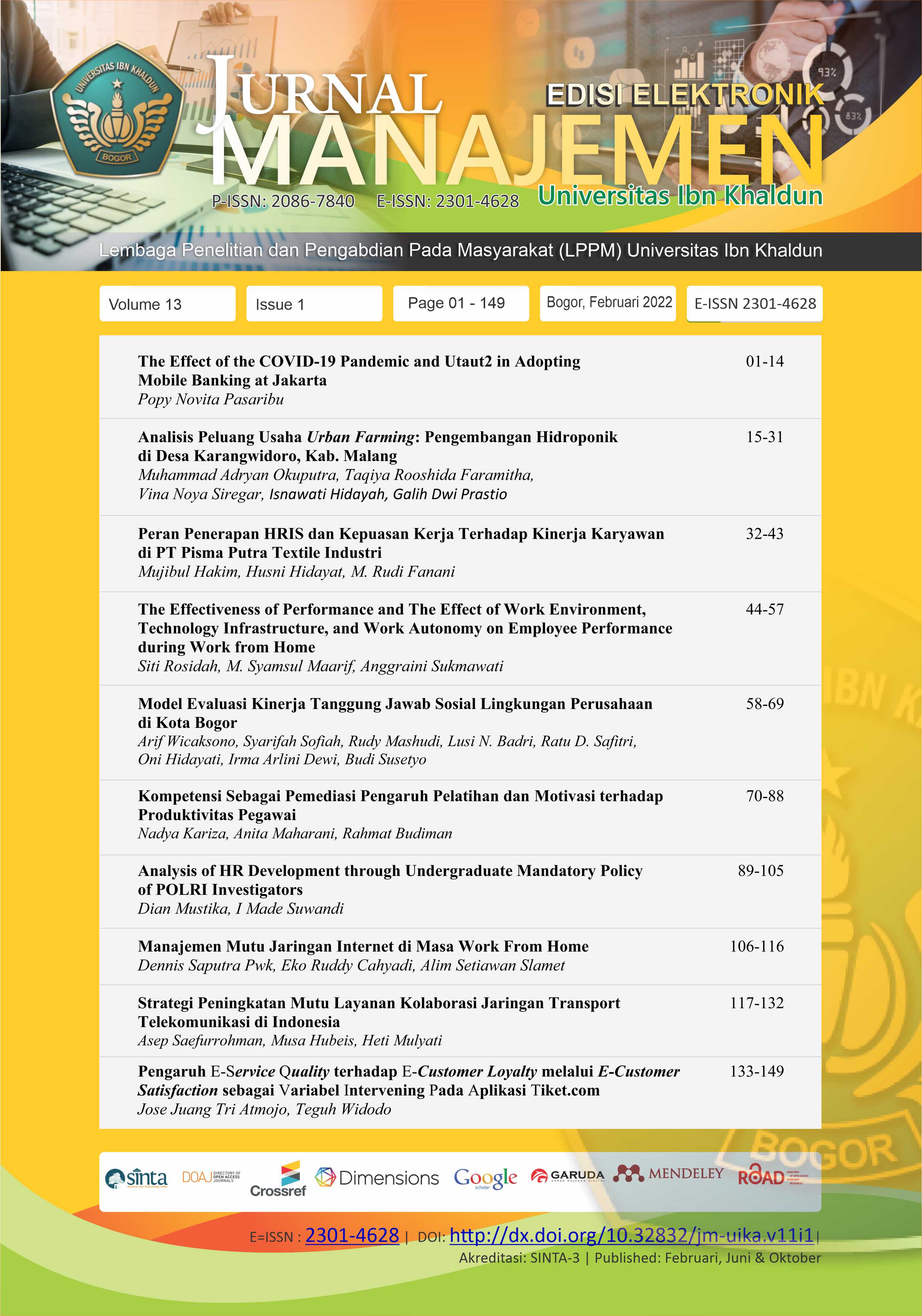Analisis Peluang Usaha Urban Farming: Pengembangan Hidroponik di Desa Karangwidoro Kab. Malang
DOI:
https://doi.org/10.32832/jm-uika.v13i1.5123Kata Kunci:
Keywords, Hydroponics, agricultural business, SWOT, urban farmingAbstrak
The growth of population in the world-wide is inline with the demand of food and land-use. However, the availability of land to produce food is tragically scarce. One of the solution which popular among society is by doing urban farming. Urban farming is a farming concept that is used as a solution in the midst of dense urban buildings and the lack of land for farming. There are various types of urban farming which one of the most popular is hydroponics. Hydroponics is considered as agriculture with a high-tech production system by small farmers. This study examines urban farming in Karangwidoro Village, Malang Regency which has been running since the beginning of 2020 with the hydroponic concept. The aim of this study to analyse the hydroponics as an effort to develop entrepreneurship among society. The methodology used is the Community-based research method and the analytical approach using SWOT (Strength, Weakness, Opportunity, and Threats) analysis. The results showed that Karangwidoro village agriculture has a great opportunity to be developed as a profit business.
Referensi
Abbas, H., Syam, R., & Jaelani, B. (2015).Rancang Bangun Sebagai Tempat Budidaya Tanaman Menggunakan Solar Cell Sebagai Sumber Listrik. Proceeding Seminar Nasional Tahunan Teknik Mesin, (SnttmXiv), 7–8.
Braun, V.J.; H.Bouis; S.Kumar and R.Pandya-Lorch. 1992. Improving Food Security of The Poor: Concept, Policy and Programs. IFPRI, Washington, DC.
Brown, K. H. and Carter, A., 2003. Urban Agriculture and Community Food Security in the United States: Farming from the City Center to the Urban Fringe, North American Urban Agriculture Committee, Community Food Security Coalition (CFSC), Ven-ice, CA.
Kisner,C., 2008. Green Roofs for Urban Food Security and Environmental Sustainability, Climate Institute, Washington, DC.
Lestari, Y., Khusumadewi, A., Fathurrohman, A., & Fitroni, H. (2019). Pemanfaatan Lahan Sempit Dengan Hidroponik Dutch Bucket System Untuk Mewujudkan Ecogreen-Pesantren Melalui Program Santripreneur Di Pondok Pesantren KHA Wahid Hasyim Bangil Pasuruan. SOEROPATI, 2(1), 71-86.
Lingga, P. (2003). Hidroponik Bercocok Tanam Tanpa Tanah. Jakarta: PT Penebar Swadaya.
Madusari, S., Astutik, D., & Sutopo, A. (2020). Inisiasi Teknologi Hidroponik Guna Mewujudkan Ketahanan Pangan Masyarakat Pesantren. Jurnal Pengabdian Masyarakat Teknik, 2(2), 45-52.
Smit, J., Ratta, A. and Nasr, J., 1996. Urban Agriculture: Food, Jobs and Sustainable Cities, United Nations Development Programme (UNDP), Habitat II Series, New York
WHO (2005) Ecosystems and Human Well-Being: Health Synthesis: A Report of the Mil-lennium Ecosystem Assessment. Geneva: World Health Organization.
Sutarni, Irawati, L., Unteawati, B., & Yolandika, C. (2018). Proses Pengambilan Keputusan Pembelian Sayuran Hidroponik di Kota Bandar Lampung. Journal of Food System and Agribusiness, 2(1), 17–24 .
Giourka, P., Sanders, M. W., Angelakoglou, K., Pramangioulis, D., Nikolopoulos, N., Rakopoulos, D., ... & Tzovaras, D. (2019). The smart city business model canvas”A smart city business modeling framework and practical tool. Energies, 12(24), 4798.
Blank, S. The Mission Model Canvas”An Adapted Business Model Canvas for Mission-Driven Organizations. Available online: https://steveblank.com/2016/02/23/the-mission-model-canvas-an-adapted-business-model-canvas-for-mission-driven-organizations/ (accessed on 14 March 2019).
Joyce, A.; Paquin, R.L. The triple layered business model canvas: A tool to design more sustainable business models. J. Clean. Prod. 2016, 135, 1474–1486.
Khodaei, H., & Ortt, R. (2019). Capturing dynamics in business model frameworks. Journal of Open Innovation: Technology, Market, and Complexity, 5(1), 8.
Umar, A., Sasongko, A. H., & Aguzman, G. (2018). Business model canvas as a solution for competing strategy of small business in Indonesia. International Journal of Entrepreneur-ship, 22(1), 1-9.
Unduhan
Diterbitkan
Cara Mengutip
Terbitan
Bagian
Lisensi
Authors who publish with this journal agree to the following terms:
- Authors retain copyright and grant the journal right of first publication with the work simultaneously licensed under a Creative Commons Attribution-NonCommercial-ShareAlike 4.0 International License that allows others to share the work with an acknowledgement of the work's authorship and initial publication in this journal.
- Authors can enter into separate, additional contractual arrangements for the non-exclusive distribution of the journal's published version of the work (e.g., post it to an institutional repository or publish it in a book), with an acknowledgement of its initial publication in this journal.
- Authors are permitted and encouraged to post their work online (e.g., in institutional repositories or on their website) prior to and during the submission process, as it can lead to productive exchanges, as well as earlier and greater citation of published work (See The Effect of Open Access).











